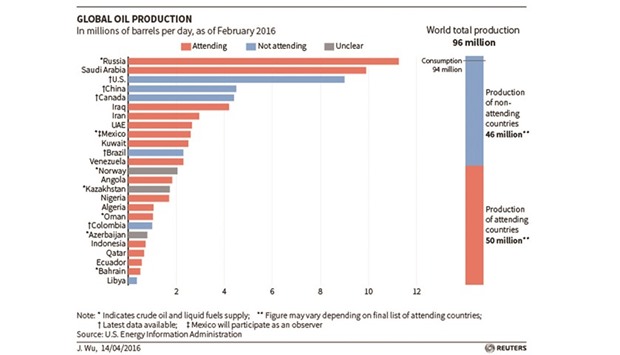Iran says it’s almost ready to talk with other Opec members about limiting oil production as the country’s exports recover to levels reached before international sanctions crippled crude sales. Morgan Stanley and Barclays say no agreement is in the cards for now.
With prices up more than 60% from the 12-year low in January, joint action by members of the Organization of Petroleum Exporting Countries may not be needed, according to Barclays analyst Miswin Mahesh in London. Morgan Stanley says higher prices are reducing the urgency for Opec to act.
“The market is set to balance, but higher prices could slow down the process,” Mahesh said by phone on Monday. “Would it really be in their long-term interest of balancing the oil market if oil prices move higher too quickly?”
The Arabian Gulf country will double crude exports to 2mn bpd this month compared with sales before sanctions were lifted in January, Oil Minister Bijan Namdar Zanganeh said in a speech in Tehran last Sunday. Lifting sales to the pre-sanctions level could pave the way for Iran and other Opec members to talk about limits on production in as soon as one or two months, Rokneddin Javadi, managing director at National Iranian Oil Co, said on Thursday.
Iran is seeking to rebuild its energy industry and restore crude sales after a January nuclear accord expanded its access to global oil markets and investment. The country refused last month to join other nations in a push to freeze output at a meeting in Doha. The talks, which Iran didn’t attend, ended in disagreement after Saudi Arabia refused to limit production without the participation of all Opec members.
Iran exported about 2mn barrels of crude daily in 2011, before US and European restrictions forced countries to stop buying from Iran, according to the Joint Organisations Data Initiative. Iran sold about half that amount once sanctions kicked in, Zanganeh said last Sunday. The country produced 3.5mn bpd of crude in April compared with about 2.8mn a year earlier, according to data compiled by Bloomberg.
Brent crude has gained 18% this year after falling 35% in 2015, buoyed partly by speculation about talks on possible production limits by Opec and other producers.
A resumption of talks about capping output probably wouldn’t have as much of an affect on oil prices today as in the weeks leading up to the Doha meeting, Ed Morse, Citigroup’s global head of commodities research, said by e-mail.
Rising production and exports from Iran is bearish for oil prices as output returns faster than expected, Adam Longson, a Morgan Stanley analyst, said in a report e-mailed on Monday. Crude and condensate output of about 4.2mn bpd is 800,000 barrels more than the country pumped in November and exceeds consensus estimates for the amount Iran would add to the market, according to the report.
“Iran may be willing to join a freeze, but only because production has exceeded expectations,” Longson said.

OIL RALLY
